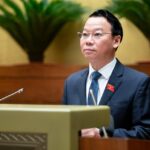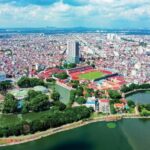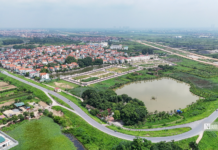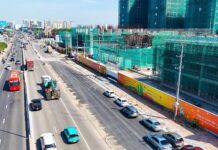At the 8th session of the 15th National Assembly, the Government presented a draft resolution on piloting the implementation of commercial housing projects through agreements on the transfer of land use rights or existing land use rights, with nationwide application. This aims to address legal difficulties faced by commercial housing projects below the scale of urban areas (less than 20 hectares). If approved by the National Assembly, it will be implemented for a period of 5 years, starting from January 1, 2025.
Unblocking Many Projects
According to Minister of Natural Resources and Environment Do Duc Duy, since July 1, 2015, the 2014 Law on Housing has had different provisions compared to the Land Law. Specifically, the condition for using land to implement commercial housing projects is to have existing land use rights for residential and other types of land. In the case of transferring land use rights, it must be for residential land.
These regulations have been carried forward in Point b, Clause 1, and Clause 6, Article 127 of the 2024 Land Law, which has restricted the implementation of commercial housing projects below the scale of urban areas, especially in new or undeveloped areas.
“In reality, the maximum land allocation for residential use by households and individuals is 400 square meters, with the remaining land being agricultural land within the same land lot. Therefore, if an investor acquires land use rights in a residential area, they still cannot proceed with the project,” said the Minister of Natural Resources and Environment.
In addition, most real estate projects are developed on land that was initially not designated for residential use, and the detailed planning of the project also includes various types of land such as residential, transportation, and green spaces. As a result, according to Point b, Clause 1, Article 127 of the 2024 Land Law, many projects cannot be implemented in practice.
The draft resolution aims to address the challenges related to the supply of real estate projects in the context of rising real estate prices, partly due to investors’ difficulties in accessing land. “There is a need to expand the conditions for transferring land use rights to implement commercial housing projects, contributing to reducing complaints from the people, ensuring fairness in land access among investors and localities, and maintaining stability in the supply of commercial housing,” said Minister Do Duc Duy.
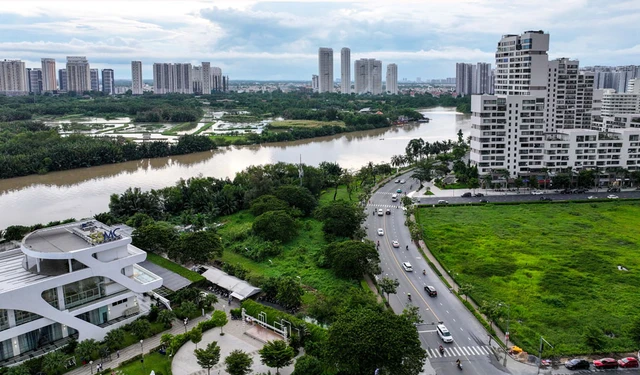
A commercial housing area in District 7, Ho Chi Minh City. Photo: Hoang Trieu
|
According to the Government’s proposal, the resolution will be applied nationwide to projects of real estate businesses in four cases: transfer of land use rights, existing land use rights, existing land use rights and transfer of land use rights, and implementation of commercial housing projects on the land area of facilities that need to be relocated due to environmental pollution or in accordance with construction planning and urban planning.
Regarding the conditions for implementing commercial housing projects through agreements on the transfer of land use rights or existing land use rights, investors will be able to implement commercial housing projects for one or more types of land: agricultural land, non-agricultural land that is not for residential use, residential land and other types of land in the same land lot in the case of an agreement on the transfer of land use rights, along with specific criteria that need to be met.
Pilot Implementation on a Narrower Scale
Discussing this issue, many National Assembly delegates agreed on the necessity of issuing the resolution to address difficulties and obstacles in implementing investment and business projects in commercial housing. Delegate Tran Hoang Ngan (Ho Chi Minh City delegation) believed that piloting this policy would have a positive impact on the socio-economic development of the country, especially in unblocking the development of commercial housing, creating favorable conditions for land users and investors to proactively implement commercial housing projects and urban development projects, and contributing to meeting the housing needs of the people.
However, there were also concerns raised by some delegates. Delegate Do Van Yen (Ba Ria-Vung Tau delegation) stated that the draft resolution proposed a very broad category of land for the pilot, which is inconsistent with the Land Law. Additionally, he suggested that the pilot should be conducted on a narrower scale, focusing on provinces and cities with urgent housing needs for their residents, instead of a nationwide implementation.
Delegate Yen also requested the Government to conduct an impact assessment to prevent situations of “taking advantage of policies to hoard agricultural land” or “legalizing violations”. He emphasized the importance of providing strict and reasonable regulations to address these concerns effectively.
Delegate Nguyen Thi Thu Ha (Quang Ninh delegation) suggested the need to evaluate the current status of commercial housing in all localities, stating that there are still many unfinished or vacant commercial housing projects and infrastructure. She pointed out that the supply and demand for commercial housing vary across localities, and “not every locality has the same demand.”
Delegate Ha requested a thorough evaluation of the current situation to understand the supply and demand dynamics in different localities before approving the draft. She emphasized that the Government and relevant agencies must conduct a comprehensive assessment and consider whether the pilot should be implemented in specific regions or localities, with clear addresses.
“The proposed pilot scheme may lead to the formation of organizations or individuals who engage in real estate business, taking advantage of the policy to buy, transfer, and aggregate land, without efficiently utilizing it, and then profiting from it by turning the means of production into an input for commercial housing projects,” warned Ms. Ha.
In the verification report, Vu Hong Thanh, Chairman of the Economic Committee, also mentioned concerns within the committee about allowing agreements for the transfer of non-residential land use rights for commercial housing projects. He stated that this could lead to a surge in prices of agricultural land and other types of land, causing difficulties for people, businesses, and the state in terms of land compensation and revocation.
Chairman Vu Hong Thanh requested the Government to review and clarify the application of the pilot mechanism through agreements on the transfer of land use rights or existing land use rights for agricultural land and non-agricultural land (commercial and service land) to prevent policy abuse.
|
Avoiding Widespread Conversion Nguyen Phuong Tuan, Vice Chairman of the National Assembly’s Committee on Science, Technology, and Environment, agreed with the nationwide implementation of the resolution to ensure fairness among localities and avoid complexities in defining criteria and conditions, as well as the emergence of a “permit-granting” mechanism. However, he suggested that specific regulations should be put in place to prevent widespread conversion of land use purposes after the regulations come into effect, as this could affect not only social welfare but also food security. |
|
Reviewing Land Use Plans of Localities Delegate Nguyen Truc Son (Ben Tre delegation) pointed out that the draft resolution has some differences compared to the recently approved Law on Investment (amended), Land Law (amended), and Law on Housing (amended). When piloting projects, it is necessary to reconsider the national land use planning, land use plans, especially the land use plans of localities. He questioned the feasibility of implementing pilot projects that are not included in the planning for residential or urban land use. |
|
Mr. Le Hoang Chau, Chairman of Ho Chi Minh City Real Estate Association (HoREA): Detailed Regulations on Determining Investment Areas HoREA has provided recommendations to the People’s Committee of Ho Chi Minh City and relevant departments regarding Decision 83/2024/QD-DT of the Ho Chi Minh City People’s Committee. It is suggested to consider amending the regulations in Clause 1, Article 2 to provide detailed guidelines on determining the areas where real estate and housing project investors are allowed to transfer land use rights with technical infrastructure to individuals for self-construction of houses in communes, excluding towns, in the five districts of Binh Chanh, Nha Be, Hoc Mon, Cu Chi, and Can Gio, and not including cases of auctioning land use rights for investment projects in accordance with the Law on Land. According to Clause 6, Article 31 of the 2023 Law on Real Estate Business, investors of real estate and housing construction projects are permitted to transfer land use rights with technical infrastructure to individuals for self-construction of houses in areas other than wards, districts, and cities of special, first, second, and third-class urban areas, and not including cases of auctioning land use rights for investment projects in accordance with the Land Law. For the remaining areas, the provincial People’s Committees shall determine the areas where investors are allowed to transfer land use rights based on the specific conditions of each locality. Mr. Ngo Duc Son, General Director of DRH Holdings Joint Stock Company: Creating Opportunities for Homebuyers Up to now, the implementation of commercial housing projects has had to meet certain conditions, such as being in line with the land use planning at the district level, conforming to construction planning and urban planning, and aligning with the approved housing development programs of the locality. However, in reality, there are overlaps and contradictions between the Land Law and the Housing Law, leading to distortions in the capital and real estate markets and increasing risks for both businesses and investors. The government’s proposal for a pilot scheme will unblock the capital market, reduce financial burdens on businesses in terms of capital usage, shorten the time and cost of project preparation, bring transparency to the market, and create opportunities for homebuyers to access reasonably priced housing options. Unblocking this bottleneck could be a lifeline for millions of struggling businesses. S.Nhung recorded |
Van Duan
Unlocking Land Access for Commercial Housing Development: Expanding Eligibility for Land Use Transfer
On the morning of November 13, Minister of Natural Resources and Environment Do Duc Duy presented to the National Assembly a proposal and a report on the pilot implementation of a resolution for commercial housing projects through agreements on the receipt of land use rights or the transfer of existing land use rights.
The Experimental Expansion of Commercial Housing Construction on Agricultural and Non-Agricultural Land: Concerns Over Soaring Housing Prices
Small businesses are often faced with an uphill battle when it comes to entering the market, as they lack the financial muscle to purchase land or bid on areas with development potential. Large investors with a land bank advantage for commercial projects in high-demand areas will continue to control sale prices to optimize their profits.
The Magic of Words: Crafting a Captivating Title
“Securing Certificates for Commercial Residences in Ho Chi Minh City: A Dedicated Task Force’s Mission”
The task force is responsible for reviewing and resolving issues related to land use certificate issuance and property ownership for commercial residential development projects in Ho Chi Minh City.

